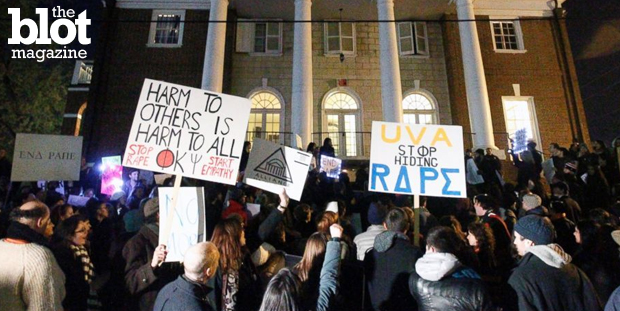
The explosive December 2014 Rolling Stone cover story entitled “A Rape on Campus,” about a terrifying sexual assault at the University of Virginia Phi Kappa Psi fraternity house, has been discredited. But the magazine running for cover in the aftermath should not take away from the seriousness of rape or mark Sabrina Erdely, the journalist who wrote the story, as unprofessional. Though the article was retracted after discrepancies were found in the victim’s account, we must remember to not become so hardened as to no longer believe the accounts of women who are brave enough to come forward with sexual assault allegations.
The story of the woman who Erdely identified only as “Jackie,” was not an accurate account, and it might not have occurred the way she described it, but that doesn’t mean nothing happened. The takeaway in most circles was that bad reporting and editing occurred by the magazine and that too much trust was given to “Jackie.” But going forward, the real shame would to become so cynical that journalists and the public won’t take stories of sexual assault seriously or scoff at allegations while trying to poke holes in victim’s accounts.
It would be favorable to get the next 99 stories wrong if the 100th exposed such a heinous act. Could the allegations have harmed reputations and cast a pall over the school? Yes, but that’s the magazine’s fault, not a possible victim’s. And if nothing else, the story focused even more attention on university culture where students are encouraged to drink at parties until blacking out. That is a verifiable fact. What goes on afterward upstairs in dorm rooms or fraternity houses in anyone’s guess, but because of past incidents and the culture that exists, it is not unreasonable to believe everything has changed.
Any possible backlash against victims — many are still reluctant to come forward — would be the real tragedy, not that the magazine failed to properly fact check, edit or properly vet the story.
Read more: Frats to Congress: Make Rape Investigations More Difficult
Groups who work to advocate on behalf of victims agree that a culture of disbelief regarding sexual assault exists. Because one account among many hundreds or thousands was not perfectly verifiable doesn’t mean the problem is not prevalent or deserving of serious attention and that victim’s accounts should not be trusted. It takes incredible courage to come forward as a victim of sexual assault, especially for a young woman while enrolled in school. If and when a victim does come forward, she becomes vulnerable to anyone with a computer and Internet connection and a desire to either poke holes in her account or react with disbelief.
Last year, several accounts of campus rape stories made their way to mainstream media outlets. And with numbers — though disputed — that tally that one in five women will be sexually assaulted during their college years, the issue has now become much more visible to the entire nation and world.
But how do people normally react? Unfortunately, usually by attempting to argue the issue down and discredit victims. The Rolling Stone retraction has already had a chilling effect on victim’s willingness to come forward with allegations. Every parent wants their child — regardless of gender or sexual orientation — to be safe while either during the day at high school or while living on a campus at a boarding academy, college or university. We owe the youth of the world and ourselves not only the responsibility to keep them safe, but to believe what they say.
Why are we so damn cynical anyway? Do people actually believe there is anything to possibly be gained by coming forward with untrue allegations? Does fame or fortune, a book deal or television show grow out of victims’ false allegations? Why are we so loath to believe victims’ accounts of sexual assault?
If this is truly to become a just society, each and every account of sexual assault, rape or inappropriate behavior needs to be taken seriously, investigated and treated with the same respect. On-campus rape and sexual assault remain prevalent at many colleges and universities. Discrediting victims is not a means to erase the real problem that for too long has gone unaddressed.
Because one account out of many didn’t occur or was described untruthfully doesn’t mean the next 100 aren’t real. Let’s better protect young people by taking every allegation seriously, not knee-jerk react with such skepticism and let one questionable account color every judgment.
Noah Zuss is a reporter for TheBlot Magazine.





